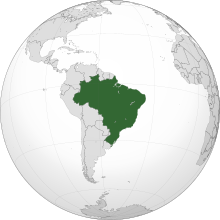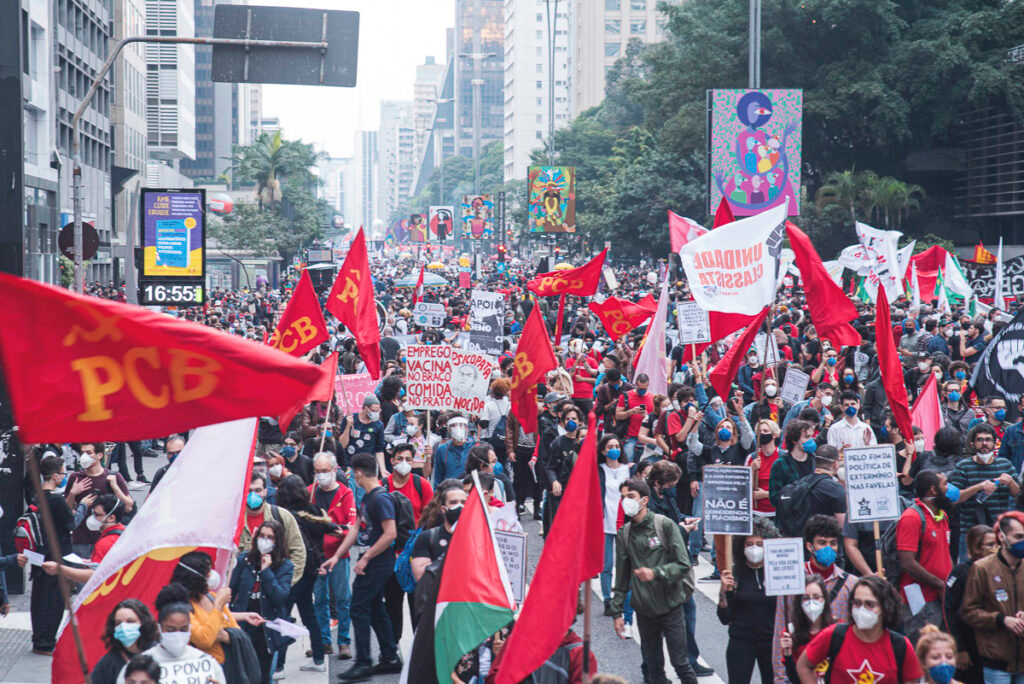More languages
More actions
| Federative Republic of Brazil República Federativa do Brasil | |
|---|---|
 | |
| Capital | Brasília |
| Largest city | São Paulo |
| Government | Federal presidential bourgeois state |
• President | Jair Bolsonaro |
• President of the Chamber of Deputies | Arthur Lira |
• President of the Federal Senate | Rodrigo Pacheco |
• President of the Supreme Federal Court | Luiz Fux |
| History | |
• Proclamation of the Empire of Brazil | 1822 September 7th |
• Proclamation of the Republic of Brazil | 1889 November 15th |
• US-backed right-wing military dictatorship | 1964 April 1st |
• Redemocratization | 1985 March 15th |
| Population | |
• 2020 estimate | 211,755,692[1] |
| Labour | |
• Labour force | 86.621 million[2] |
• Labour force participation | 56.8%[4] |
• Occupation | agriculture: 9.4% industry: 32.1% services: 58.5%[2] |
• Unemployment rate | 14.7%[3] |
| GDP (nominal) | 2019 estimate |
• Total | US$1.84 trillion[5] |
• Per capita | US$8,717.18[6] |
| Exports | 2019 estimate |
• Value | US$263 billion[7] |
• Commodities | soybeans, crude petroleum, iron, corn, wood pulp products[2] |
• Partners | China (28%), United States (13%)[2] |
| Imports | 2019 estimate |
• Value | US$269 billion[8] |
• Commodities | refined petroleum, vehicle parts, crude petroleum, integrated circuits, pesticides[2] |
• Partners | China (21%), United States (18%), Germany (6%) |
| External debt | US$684.6 billion (20th) |
| Gini (2018) | 53.9% (9th) |
| HDI (2019) | 0.765 (84th) |
| Currency | Brazilian real (BRL) |
Brazil, officially the Federative Republic of Brazil, is a country in Latin America. It is the most populous country in its continent. It is a dependent capitalist country.[9]
Since 2019, the country has been under the government of Jair Bolsonaro who promoted and enacted policies of privatization of state-owned enterprises led by the Chicago Boys member Paulo Guedes. It is a de facto military government, composed of 6.1 thousand military personnel in public offices,[10] more than 2.3 thousand irregularly.[11]
History
Pre-colonization (~60,000 BCE – 1500)
Colonization period (1500–1822)
Empire era (1822–1889)
Republic era (1889–present)
In 1961, centrist president Jânio Quadros resigned after seven months in office, leading to his anti-imperialist vice president, João Goulart, becoming president. Goulart supported agrarian reform and universal suffrage and was supported by Catholic bishops and members of student unions. The United States turned on him after he refused to ban leftists from his cabinet and the CIA began funding his opponents in October 1962.[12] On 31 March 1964, he was overthrown in a military coup.[13]
Military dictatorship (1964–1985)
Soon after the coup, the military abolished the 1946 constitution and banned the General Confederation of Workers (CGT) and National Students' Union (UNE). Other unions were allowed, but their leadership was controlled by the government. In 1968, military leader Artur da Costa e Silva passed Institutional Act No. 5, removing all limits on the military dictatorship's power. Under the dictatorship, 50,000 people were arrested, 7,000 were exiled, and over 400 were killed. Brazil's intelligence service, the SNI, was trained to torture dissidents by CIA agent Dan Mitrione. At two torture centers, the House of Death in Pétropolis and the Kerosene Nightclub in São Paulo, almost everyone who was tortured died.
After Costa e Silva's death in 1969, Emílio Garrastazu Médici took power and ruled until 1974. He abolished the National Congress, gave all power to the presidency, and banned public demonstrations. In the mid-1970s, ten members of the Brazilian Communist Party (PCB) Central Committee were murdered and their bodies were hidden in a river. Almost all leadership of the PCB was arrested and 2,000 militants were tortured. PCB leader Elson Costa was tortured for more than 20 days and was burned alive after refusing to give information.[13]
Institutional Act 5 was repealed in 1978[13] and military rule ended in 1985.[14]
Recent history (1985–present)
In 2002, Luiz Inácio Lula da Silva of the Workers' Party was elected president after building an alliance with centrists. Lula enacted social programs that reduced poverty and increased access to higher education. In 2010, Lula was succeeded by Dilma Rousseff. In 2014, an economic crisis began in Brazil and austerity measures were enacted. The right organized the impeachment of Rousseff and her vice president, Michel Temer, took power in 2016. In 2018, Lula was arrested and prevented from running for president. A left-wing coalition that included the PCB and the Socialism and Liberty Party supported the Workers' Party candidate Fernando Haddad. Haddad lost the election with 44.87% of the vote, and Jair Bolsonaro of the far-right "Brazil above Everything, God above Everyone" coalition won with 55.13% of the vote.[15]
Economy
Brazil exports $28.6B of soybeans (13.36%), $26.5B of iron ore (12.38%), $19.8B of crude petroleum (9.25%), $8.95B of raw sugar (4.18%), $6.69B of bovine meat (3.12%) and $123.5B of other products, totaling $214B in exports. These exports flow mostly towards China ($67.9B), United States ($21.9B), Argentina ($8.57B), Netherlands ($6.7B), and Canada ($4.39B).[16]
Politics
Class struggle in Brazil

In June 19th, 2021, protesters in over 400 cities in protest of the fascist Jair Bolsonaro government. Militants and activists gathered safely, respecting social isolation guidelines related to the COVID-19 pandemic.[17]
Infrastructure
Demographics
Culture
References
- ↑ Brazilian Institute of Geography and Statistics (2020). Estimates published in official government documents.
- ↑ 2.0 2.1 2.2 2.3 2.4 CIA World Factbook (2020). Brazil – The world factbook (economy)
- ↑ Trading economics (2021). Brazil unemployment rate
- ↑ Trading economics (2021). Brazil labor force participation rate
- ↑ World Bank (2019). GDP (current US$) - Brazil
- ↑ World Bank (2019). GDP per capita (current US$) - Brazil
- ↑ World Bank (2019). Exports of goods and services (current US$) - Brazil
- ↑ World Bank (2019). Imports of goods and services (current US$) - Brazil
- ↑ Ruy Mauro Marini (1973). Dialética da dependência. [MIA]
- ↑ "Segundo TCU, 6,1 mil militares ocupam cargos no governo" (2020-07-17). Correio Braziliense. Retrieved 2022-07-16.
- ↑ "CGU aponta pagamentos e ocupações irregulares de 2,3 mil militares" (2022-07-12). Carta Capital. Retrieved 2022-07-16.
- ↑ Matias Spektor (2018). The United States and the 1964 Brazilian Military Coup (pp. 1–3). [PDF] Oxford Research Encyclopedia of Latin American History.
- ↑ 13.0 13.1 13.2 Edmilson Costa (2019-12-23). "Remembering the Years of Lead under Brazil’s military rule: AI-5 never again!" Liberation School. Archived from the original on 2021-05-15. Retrieved 2022-06-21.
- ↑ Nicholas Stender (2021-09-08). "Bolsonaro’s coup threats rejected by people of Brazil" Liberation News. Archived from the original on 2021-12-20. Retrieved 2022-06-21.
- ↑ Silvio Rodrigues (2019-01-23). "Bolsonaro: A danger to Brazil, Latin America, and the whole world" Liberation School. Archived from the original on 2021-01-17. Retrieved 2022-06-05.
- ↑ "Brazil (BRA) exports, imports, and trade partners" (2020). Observatory of Economic Complexity (OEC).
- ↑ Beatriz Drague Ramos (2021-06-21). For vaccines for all and against Bolsonaro, demonstrators take to the streets this Saturday [Portuguese: Por vacinas para todos e contra Bolsonaro, manifestantes vão às ruas neste sábado]. Ponte Jornalismo.


